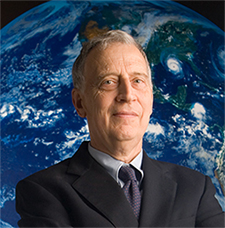 Ralph J. Cicerone, immediate past president of the National Academy of Sciences, died on November 5, 2016, at the age of 73, according to a memorial notice from the Academy. "The entire scientific community is mourning the sudden and untimely loss of this great leader who has been unexpectedly removed from the forefront of the scientific issues that matter most to the future well-being of society," Marcia McNutt, Cicerone's successor as president of the National Academy of Sciences, was quoted in the memorial notice as commenting. "Ralph Cicerone was a model for all of us of not only doing what counts, but doing it with honesty, integrity, and deep passion."
Ralph J. Cicerone, immediate past president of the National Academy of Sciences, died on November 5, 2016, at the age of 73, according to a memorial notice from the Academy. "The entire scientific community is mourning the sudden and untimely loss of this great leader who has been unexpectedly removed from the forefront of the scientific issues that matter most to the future well-being of society," Marcia McNutt, Cicerone's successor as president of the National Academy of Sciences, was quoted in the memorial notice as commenting. "Ralph Cicerone was a model for all of us of not only doing what counts, but doing it with honesty, integrity, and deep passion."
During his time at the Academy Cicerone was a strong and effective voice for both climate education and evolution education. In the words of the Academy's memorial notice, "Cicerone was an atmospheric scientist whose research placed him at the forefront in shaping science and environmental policy, both nationally and internationally. In 2001, he led a key National Academy of Sciences study about climate change requested by President George W. Bush. Ten years later, under Cicerone's leadership, a comprehensive set of reports titled America's Climate Choices, which called for action on reducing greenhouse gas emissions while identifying strategies to help the nation and world adapt to a changing climate, were issued. Under Cicerone's guidance, the NAS and the Royal Society — the science academy of the U.K. — teamed up in 2014 to produce Climate Change: Evidence and Causes, a readable publication written for policymakers, educators, and members of the public." Cicerone also helped to develop the Academy's 2008 publication Science, Evolution, and Creationism, a book designed to give the public a comprehensive and up-to-date picture of the current scientific understanding of evolution and its importance in the science classroom.
Cicerone was born in New Castle, Pennsylvania, on May 2, 1943. He received his B.S.E.E. from the Massachusetts Institute of Technology in 1965 and his M.S. and Ph.D. in Electrical Engineering and Physics from the University of Illinois, Urbana-Champaign, in 1967 and 1970. He was a researcher at the University of Michigan, the University of California, San Diego, and the National Center for Atmospheric Research before moving to the University of California, Irvine, in 1989, where he served as Chancellor from 1998 to 2005. He then served as the president of the National Academy of Sciences from 2005 to 2016. His honors included the Roger Revell Medal from the American Geophysical Union.
